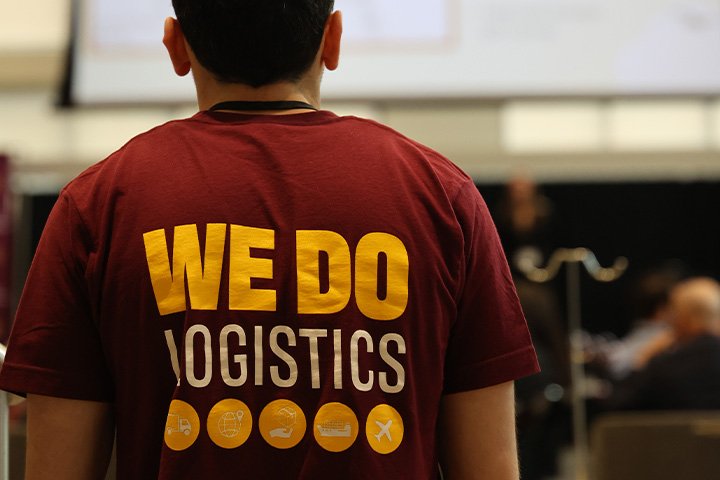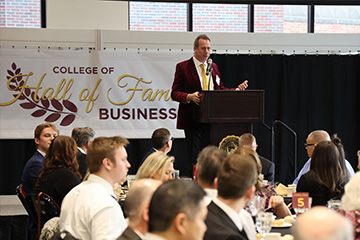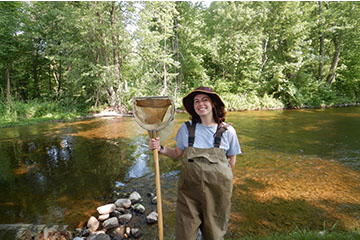Logistics competition prepares students for real-world success
Out-of-classroom experience builds a competitive edge and skills beyond the classroom

On October 25, Central Michigan University held its fourth annual Logistics Undergraduate Case Competition, a full-day event open to all CMU students. The competition brought together students, faculty, and industry leaders, highlighting the College of Business Administration’s dedication to experiential learning and offering students hands-on opportunities to practice their professional skills.
Event organizer and faculty member Jim Taelman opened the day by welcoming students and industry partners, sharing his enthusiasm about the record turnout. With 92 students participating and support from five companies—including Penske Logistics, Dow, Gordon Food Services (GFS), Kimberly-Clark, and Ryder—the event’s size reflected its growing popularity.
“This is the fourth annual competition, and each year it’s getting bigger,” Taelman said. “It’s amazing to see the students and industry partners return year after year—next year, we may have to consider a larger location.”
The event offered two separate competitions: a case competition for juniors and seniors, and an ERP simulation for freshmen and sophomores. Both events challenged students to apply classroom knowledge to real-world business scenarios, a hallmark of the College of Business Administration’s experiential learning approach.
Analysis and strategy key in logistics showdown
In the case competition, teams tackled a transportation procurement challenge with real-world data from GFS and Penske. Over two weeks, they analyzed data, crafted RFPs, and researched industry trends before presenting their recommendations. Their objective: optimize carrier routes and logistics by balancing quality, cost, and safety, while proposing technical improvements to boost efficiency and customer satisfaction.
Event co-lead and faculty member Evelyn Smith emphasized the impact of these experiences, noting, “Presenting ideas to industry experts and responding to questions on the fly builds invaluable skills.”
However, the case competition wasn’t just about solving a technical problem. It was about presenting solutions clearly and strategically, learning to think on your feet, and communicating effectively with industry leaders.
The corporate partners, three of which have participated in all four years of the competition, judged the teams’ analysis, route adjustment, technical recommendations and presentations, and were impressed by the quality of the students’ work.
“One of the great things about logistics is that it pulls everyone in,” Taelman said. “You’ve got students studying procurement, logistics, accounting, marketing—all of them are vital to the process. It’s a black hole of opportunity.”
During the case competition finals, three teams—Fired Up Consultants, Lucc Legends, and Freight Flow—presented their solutions in front of a panel of judges. Each team had 15 minutes to present their analysis and recommendations, followed by a tough Q&A session. The judges’ questions pushed students to critically evaluate their decisions. In the end, Freight Flow’s strategic analysis and recommendations earned first place, with Fired Up Consultants second, and Lucc Legends third.
Maple syrup simulation tests strategy skills
Concurrent with the case competition, the ERP simulation offered underclassmen a unique learning experience through a maple syrup supply chain game. Students simulated real-world business decisions by purchasing syrup from a Canadian supplier and selling it to German grocery stores. Their goal: maximize company valuation by managing supply chain costs, warehousing and pricing.
Many students had participated in similar simulations in the classroom, but this competitive atmosphere brought a new level of intensity. The winning team, Team Delta, pulled ahead in the final days of the simulation and ended with a company valuation of $1,284,704, earning each member a $500 scholarship.
In total, $12,000 in scholarships—generously donated by CMU alumni Jim and Renaye Damman—were awarded between the two competitions.
Building connections beyond the classroom
Beyond monetary awards, the event fostered strong connections between students and faculty, reflecting CBA’s emphasis on building close relationships. Faculty members knew many of the students by name and engaged in warm, friendly exchanges throughout the day. Dean Moberg, addressing the students, encouraged them to take advantage of these opportunities, saying, “Saying ‘yes’ matters. When you try new things, you discover who you are, and you happen to meet the right people.”
Moberg’s words underscored the importance of out-of-classroom experiences like this competition in preparing students for their professional lives. By facing real-world challenges and engaging directly with industry experts, students set themselves apart from their peers and gain valuable experience that will serve them in their careers.
Through events like the Logistics Undergraduate Case Competition, CMU’s College of Business Administration continues to equip students with the skills and experiences needed to thrive professionally. For more information on the CBA’s logistics management program, contact Jim Taelman (taelm1ja@cmich.edu) or Evelyn Smith (smith8e@cmich.edu).




